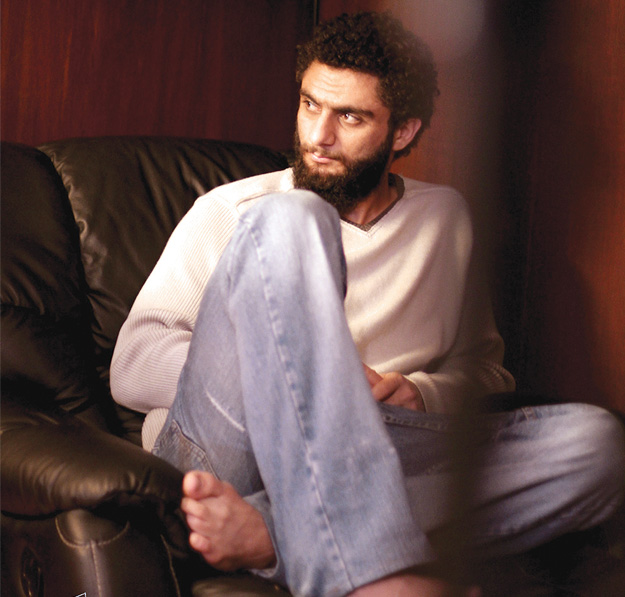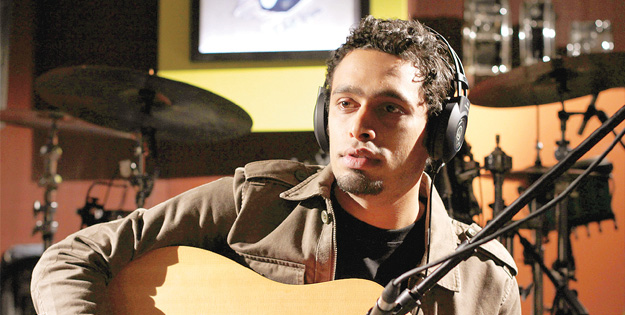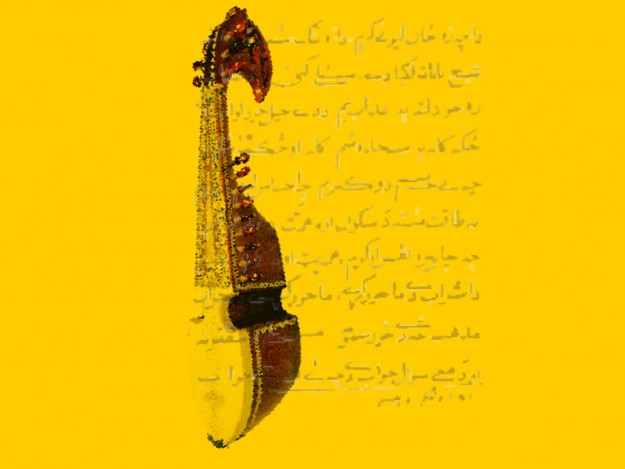
Yasir & Jawad first appeared on “Uth Records” featuring their song “Reidi Gul” which was an outright success. A blend of folk Pushto poetry, fusion of traditional and modern instruments, and three talented boys from Khyber-Pakhtunkhwa — Yasir, Jawad, and Wali.
After a hiatus of almost two years the Pashto band is back with their new song titled “Niqab,” wrapped in a creative expression which they said is a musically versatile and challenging project for them. The song highlights the concepts of existentialism; a philosophical movement from the mid-19th century that focuses on the experiences of the individual.
The poetry
Unlike their first song, “Niqaab” is one of the less popular works by the legendary Pashto poet Ghani Khan who had stated: “Pashtun is not merely a race but, in fact, a state of mind; there is a Pashtun lying inside every man, who at times wakes up and overpowers him.”
Yasif & Jawad’s new song is an extension of Khan’s rebellion against the clergy; something that is seen in his Kuliyat that eventually led to his existentialist crises. A clear example of his attitude is shown in the following stanza:
“The clergy keeps reciting tales of torment and agony,

Vocalist Abdul Wali Orakzai
Yet, here I am, tormented by existence and feelings”
It is important to note the time period in which Khan’s poetry is being repackaged by the band for the Pushto and non-Pushto listeners. The band wants to make a statement with the use of Khan’s lyrics like “Religion is but some rituals, tales and a rationale; It is the answer to a question that does not have any answer.” This makes us realise the importance of progressive writers in literature and how timely it is to revive the works of such influential poets, be it in any language.
The music
After the poetry, the music is what “Niqab” scores for especially the sound of the rabab which grounds the song to the Pashto culture. The band’s effort is seen in their music and it’s probably something they have worked the hardest on. Interestingly enough, the major genre shifts from folk-rock to a more electronic pop sound with trippy departures towards the end. The arrangement of the rabab, guitars and drums and the heavy work in post production gives the overall sound a very contemporary feel. The newer breed of musicians coming from Peshawar have been highly influenced by Sajid & Zeeshan’s music. They were the first ones to properly introduce electronic pop music in Pakistan.

Jawad Iqbal
The Video
When making a video around a philosophical theme, the artist needs to intellectually use visual metaphors and narratives. If not utilised properly, they can drown the whole project. Director Mian Abdur Rehman stuns you with powerful shots, showing both band members and characters performing with a rebellious attitude. The message comes across crystal clear.
The video begins with a young man working out in the gym and later on wandering around in the wilderness with a gas mask on his face; the facial expressions are an exhibit of his rage and trauma. A cliché scene of a teenager getting high on cocaine to escape reality was a bit of an injustice to the poem since the director’s approach was to make an unusual and visually strong video on a tight budget.
Name of the band
Yasir Rehman and Jawad Iqbal came together in 2008, and Abdul Wali Orakzai joined the band two years later as the lead vocalist. Since Yasir & Jawad (the band) was already gaining popularity on You Tube, Wali’s name was not added. This, however, does not exclude him from the band.

Niqab
Translation by Ismet Shahjehan
I drive myself mad: suffocated by existence
The clergy keeps reciting tales of torment and agony
Yet, here I am, tormented by existence and feelings
So, at times I stoop to God; at times I seek refuge in wine
When oblivious, I vanish; when conscious, I am in anguish
Without the strength for peace, without the courage to agitate, when I look all over, it is my own being, revealed and concealed:
I am the one who made the nectar; I am the one who made the pulpit
Religion is but some rituals, tales and a rationale
It is the answer to a question that does not have any answer!
Published in The Express Tribune, December 5th, 2012.
Like Life & Style on Facebook and follow at @ETLifeandStyle for the latest in fashion, gossip, entertainment
COMMENTS (8)
Comments are moderated and generally will be posted if they are on-topic and not abusive.
For more information, please see our Comments FAQ
1729662874-0/One-Direction-(1)1729662874-0-405x300.webp)


1722421515-0/BeFunky-collage-(19)1722421515-0-165x106.webp)

1732102425-0/Untitled-design-(26)1732102425-0-270x192.webp)
1732087068-0/Untitled-design-(21)1732087068-0-270x192.webp)










@A R Khan Yusufzai:
Whoever took that decision and whoever implemented it must be having a brain of a pigeon .. what's next, ban breathing because someone somewhere was sloganeering against our beliefs. We are the biggest hypocrites on the name of religion .. just few days ago we destroyed a religious place for Hindus despite the fact that our own religion says to respect such places for minorities. I wonder where are all those hiding who took out huge rallies on Babri mosque demolition.
The music is awsome and Wali has great vocals. I am not going to praise poetry since its a timeless piece and Ghani Khan's name is all praise to his work. Keep up the good work. I think more people should come forward and make such music for revival of the society.
@A R Khan Yusufzai: Link for youtube-less people. http://vimeo.com/54542718
A masterpiece of Ghani. The translation by Ismet Shahjehan is too verbalise for the understanding of a simple soul. Music is perfect, and the vocals are impeccable.
@Danish: Youtube is banned in Pakistan. Can you share an alternative Daily Motion link for the readers interest?
For those who are interested in the video, here is the link https://www.youtube.com/watch?v=0m3Qo_NWZeo
Sounds Exciting !! Where is soundcloud link ?
Ghani Khan was a renaissance man and his timeless poetry has revitalized a new generation of Pashtun artists ushering in a Pashtun Renaissance.
Zhwandai di we da Pashtano tolana aw honarmandan.